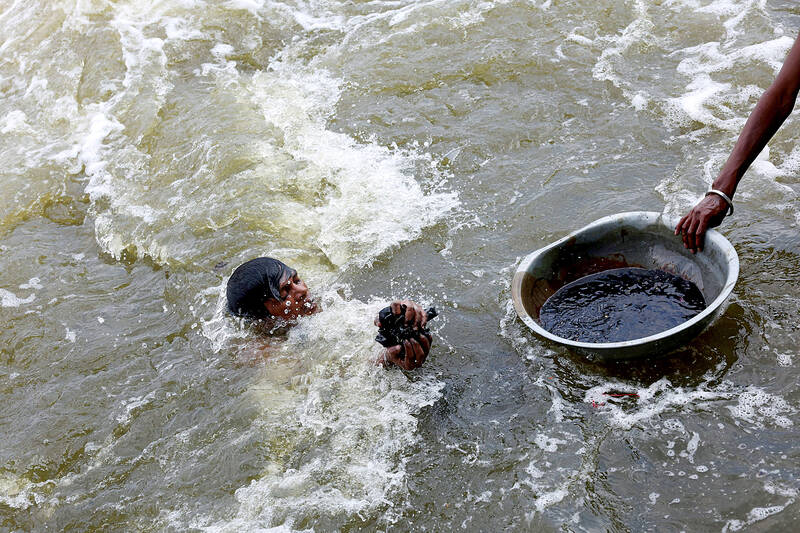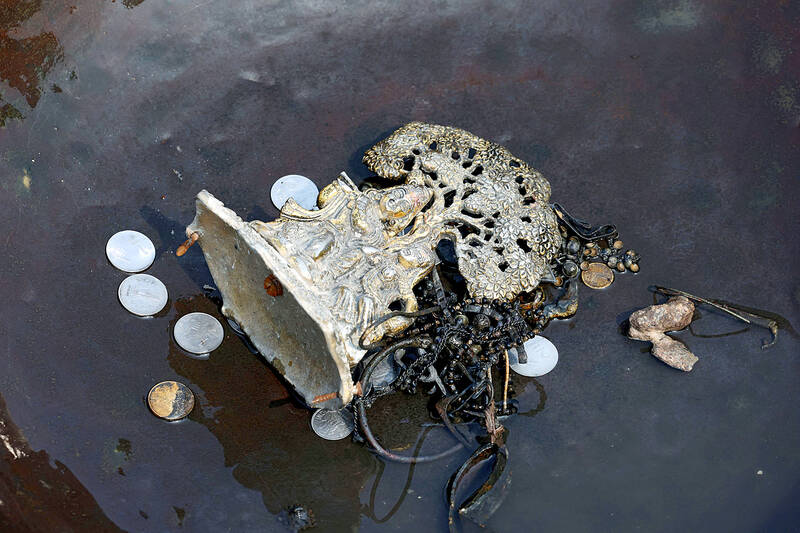At the crack of dawn, Ramu Gupta slings a blue bag onto his shoulder and heads to the Yamuna River in the Indian capital in search of his fortune.
The 67-year-old is one of hundreds of gotakhors, or divers, who go to the river to hunt for coins, trinkets, discarded bottles, and shards of metal and wood that can be sold in Delhi’s booming scrap market.
“I earn approximately 5,000 rupees [US$58] in a month from this,” said Gupta, who spends his days working as a toilet cleaner near the shack where he lives.

Photo: Reuters
He saves the extra income for his two grandchildren, hoping to split it between them when they grow up.
Hindus consider rivers as holy and pilgrims toss offerings including coins, coconuts and flowers into the water for the “river goddess” who sustains lives by giving water for drinking and irrigation.
They regard the Yamuna, which originates in the Himalayas, as one of the most sacred in India, cremating the dead on its banks and throwing their most precious possessions, including jewelry, into the waters along with their loved ones’ ashes.

Photo: Reuters
Gupta and his fellow divers swim beneath the polluted waters, often risking their health in their search for riches.
He is at the river in the morning and evening seven days a week, and goes to his regular work during the day — a routine that he has followed for 35 years.
Arvind Kumar, 29, has been working on the river full time for nearly 12 years.
“There is no fixed income from this kind of work,” said Kumar, who earns up to 600 rupees per day on average, below the government’s minimum daily wage of 710 rupees for an unskilled worker.
Mostly, the divers collect coins, bottles and plastics. Occasionally they might discover some slivers of gold. More rarely, gold rings and necklaces.
Sometimes, they also find bodies, and then the police might call on them to help retrieve them. If they see people carried away by the currents, they might try to rescue them.
That makes the divers “happier than the person rescued,” Gupta said.
A devout Hindu, Gupta said he was not afraid of the river because he had the protection of “Mata Rani,” the Hindu mother goddess.
“So why be scared?” he said. “If she wants, I will die; if she wants me to live, she’ll save me.”

Philippine President Ferdinand Marcos Jr has fired his national police chief, who gained attention for leading the separate arrests of former Philippine president Rodrigo Duterte on orders of the International Criminal Court and televangelist Apollo Carreon Quiboloy, who is on the FBI’s most-wanted list for alleged child sex trafficking. Philippine Executive Secretary Lucas Bersamin did not cite a reason for the removal of General Nicolas Torre as head of the 232,000-member national police force, a position he was appointed to by Marcos in May and which he would have held until 2027. He was replaced by another senior police general, Jose

STILL AFLOAT: Satellite images show that a Chinese ship damaged in a collision earlier this month was under repair on Hainan, but Beijing has not commented on the incident Australia, Canada and the Philippines on Wednesday deployed three warships and aircraft for drills against simulated aerial threats off a disputed South China Sea shoal where Chinese forces have used risky maneuvers to try to drive away Manila’s aircraft and ships. The Philippine military said the naval drills east of Scarborough Shoal (Huangyan Island, 黃岩島) were concluded safely, and it did not mention any encounter with China’s coast guard, navy or suspected militia ships, which have been closely guarding the uninhabited fishing atoll off northwestern Philippines for years. Chinese officials did not immediately issue any comment on the naval drills, but they

POWER CONFLICT: The US president threatened to deploy National Guards in Baltimore. US media reports said he is also planning to station troops in Chicago US President Donald Trump on Sunday threatened to deploy National Guard troops to yet another Democratic stronghold, the Maryland city of Baltimore, as he seeks to expand his crackdown on crime and immigration. The Republican’s latest online rant about an “out of control, crime-ridden” city comes as Democratic state leaders — including Maryland Governor Wes Moore — line up to berate Trump on a high-profile political stage. Trump this month deployed the National Guard to the streets of Washington, in a widely criticized show of force the president said amounts to a federal takeover of US capital policing. The Guard began carrying

Ukrainian drone attacks overnight on several Russian power and energy facilities forced capacity reduction at the Kursk Nuclear Power Plant and set a fuel export terminal in Ust-Luga on fire, Russian officials said yesterday. A drone attack on the Kursk nuclear plant, not far from the border with Ukraine, damaged an auxiliary transformer and led to 50 percent reduction in the operating capacity at unit three of the plant, the plant’s press service said. There were no injuries and a fire sparked by the attack was promptly extinguished, the plant said. Radiation levels at the site and in the surrounding